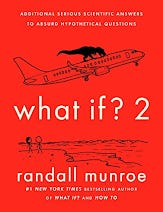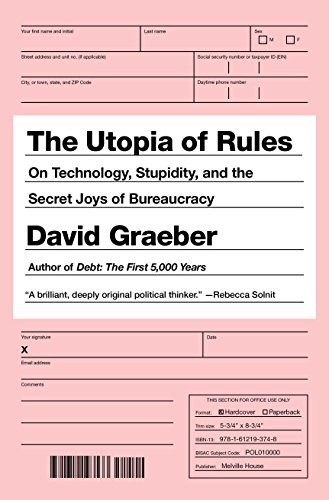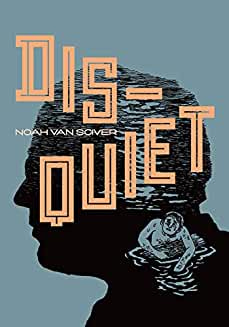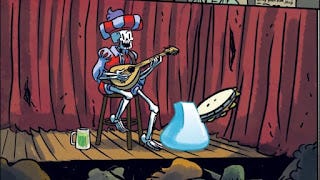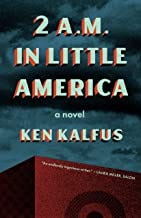A little dystopic fun for everyone
Even you!
.
It's reasonable to say that everything here is either dystopian or includes dystopia or contains recipes for dystopia. In one case, a recipe we have already followed. Isn't that fun!
.
119) What If? 2 by Randall Munroe, finished October 28
This book is so delightful. Like all of Munroe's work. I believe I am a completist.
But how else will you learn that t-rexes and elephants weigh roughly the same? Or that even touching a room-temperature star will kill you?
And constant undercurrent of humor leaves you not quite ready for the big laughs that suddenly appear. (My favorite might by a dry citation for—where were you in 1999?)
But I especially enjoy reading xkcd and family because Randall is clearly a decent human being with a burgeoning curiosity and a love of knowledge that bubbles out into selfless sharing.
I mean, I say "selfless" but he must be loaded by now. Good for you, Randall! You deserve it!
over a week
120) The Utopia of Rules: On Technology, Stupidity, and the Secret Joys of Bureaucracy by David Graeber, finished October 28
I keep hearing about The History of Everything which this author cowrote with his friend David Wengrow. As they worked on it, the project grew and grew to multiple projected volumes. Then Graeber died. The project's future is now unknown.
I checked History out from the library when I saw its size (704pp) I knew it was dangerous to try to read it as a library book. This is a book I would need to buy.
So in the meantime, I went back to the library site, intending to put a book or two from each of them on hold. I had plenty of Graeber books to choose from but nothing by Wengrow. This volume was the first to arrive and boy oh boy is it excellent!
Graeber is an anthropologist by training and he has trained his anthropology on the boring nonsense of our own world. And he's brilliant. I wish i had not been a library book because I wanted to mark it up like a madman. One read wasn't enough to completely rejigger my political outlook, but this is an intellectual exploration of the politics I've been looking for. The Millennium will be anarchy.
Speaking of anarchy, I assume it is because Graeber is an anarchist that you can read this book free online.
Among the worthwhile things this book explores will be the purposes of imagination, the damages caused by capitalism, why the future we were promised had to be suppressed, why the third Nolan Batman movie bit rocks, the relationship between language and play, how come grammar books are lies, why it isn't the least surprising police are terrible, how bureaucracy is simply a way of managing violence, and why we like it anyway.
Reading something like this makes me wish I was an academic, that I could spend all my time thinking thoughts with the great thinkers. But in the end, I'm still a storyteller.
This book, incidentally, will also tell you how our stories enforce the power structure even when we don't want them too. Alas.
most of the month
121) Disquiet by Noah Van Sciver, finished November 3
I didn't buy this when it was released because I figured I'd already read most of it. Not so. I'd ready maaaaybe half. Probably less. But "Punks V. Lizards" is too memorable to forget, no matter how many years have passed.
Anyway, it's a solid collection by an excellent artist. But if you're starting off, I recommend something full-length. His shorts are good, but he found mastery in the long.
a week or so
122) Rickety Stitch and the Gelatinous Goo: The Road to Epoli by Ben Costa and James Park, finished November 3
When I opened to its first page I was startled and delighted to see the story was in black and white? Could it be possible? I was thrilled!
Ends up it's only some . . . flashbacks? that are in black and white. The rest of the story is good, but I didn't realize how tired I've become of the current crop of color comics for kids.
My favorite aspect of the book is the title characters—a skeleton and a blob and yet so expressive. Even surrounded by other (soulless) skeletons and without his distinctive costume, Rickety can be recognized through subtle touches to his skull. It's terrific.
My 12yrold read all three currently-out volumes before I even picked up the first one (when does he read? I never see him reading?) and wanted to know if the library also had the fourth as, goldarn it, #3 ended in a cliffhanger. The answer, incidentally, is no, but I imagine we'll see it soon.
As for me, I dunno if I'll read on from one. It was entertaining, but I have a lot of books on my to-do list, and I don't know. I just don't know.
Maybe just so we have something to talk about.
And maybe I'll like it more as it rolls on, myself.
under a week
123) 2 A.M. in Little America by Ken Kalfus, finished November 8
First, I disagree that this is a dystopia. It will give you many of the same feelings, but there's no design to this world, no power striving to make some version of perfection that, surprise!, is awful.
No, this is just a distressing realistic imagining of what might happen to us Americans after our country has devolved into a borderless civil war, bloody massacres and constant suspicions—where we run to and how we try to live and how our new host nations are not happy with our presence.
And it's excellent at that. It feels real. It feels plausible.
One thing I don't like about the book is the side effects of how Kalfus represents his main character's trauma. That he has a hard time recognizing people, especially women, fine. I can accept that. But he uses that as an excuse to make everything uncertain. No city or nation is named, few people get names, his dog has a name but it's a placename so we don't get that either. I get that he's trying to make everything on the American side more universal and everything on the not-America side less graspable, but it requires some rhetorical stretches that get too artificial for their own good.
All that aside, I recommend reading it. If we do devolve to war (a less insane prospect by the month) it would be a war apt to awfulness. Perhaps a reflection of that future may give us pause.
how long goes here
124) All's Faire in Middle School by Victoria Jamieson, finished November 11
This is by family-favorite author of Roller Girl (first reading) and it's similar—girl with an unusual sidelife managing the travails of early adolescence—but it's a very different book all the same, tackling new concerns in new ways.
This time the girl's family works at a Florida renaissance faire and she has decided to leave behind homeschooling for schoolschooling. Things go wrong, she makes mistakes, she grows up, lessons are learned, etc.
I didn't like it as much as Roller Girl (most recent reading) but it's a satisfying read with earned emotional beats. What else are you asking for?
almost twenty days
125) The Lathe of Heaven by Ursula K. LeGuin, finished November 16
I didn't know much about this 1971 novel coming into it, except that it's dystopianish. The first half I wasn't sure that was true. But it became true as reality is piled atop reality.
I see a couple low-budget adaptations have been filmed, but post-Dr Strange movies, I think we're ready to really visualize this. I'm not sure it's a good idea, but it can be done.
In short, what if your dreams could recreate reality? What responsibility would this lay upon you? Would you strive to dream intentionally? or not to dream at all?
a week



